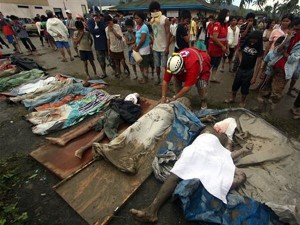UN sends out call for $47-M aid for Mindanao rehab in 2013

Top officials of the UN Office for the Coordination of Humanitarian Affairs (UNOCHA) also bared on Thursday that it has started downsizing its operations on the ground in typhoon-hit parts of Mindanao as operations shifted from immediate relief to long-term rehabilitation.
The $47 million is part of a $91-million call for aid under the agency’s revised humanitarian action plan for Central and Western Mindanao as of this month, according to David Carden, head of OCHA Philippines.
“This revised plan will help us to meet the ongoing needs of those affected by Pablo, particularly in the areas of shelter, because people need shelter and livelihood,” Carden said in a press conference on Thursday.
“The requirements are still there in the areas of shelter, education, socio-psychological rehabilitation. A lot of people who lost relatives, friends, they are recovering now and I’d say we don’t have much time… We have to move rather quickly,” Rashid Khalikov, Geneva-based UNOCHA director who led a high-level visit of aid officials and international donors to Maguindanao this week.
Carden said the revised call for aid aimed to “meet the humanitarian and protection needs of 530,000 affected people” in the region, including Compostela Valley and Davao Oriental, which were severely hit by the typhoon in December 2012.
Article continues after this advertisementThe amount would cover some 105 projects in the disaster and conflict areas, particularly in terms of shelter and income generation for survivors.
Article continues after this advertisementA high-level delegation from UNOCHA, the Organization of Islamic Cooperation and the Philippine government wrapped up, on Thursday, a four-day mission that assessed remaining humanitarian needs in Central and Western Mindanao, particularly in Compostela Valley and parts of Maguindanao.
Khalikov noted “very good cooperation” among responding agencies, among them UN organizations, non-government organizations and the donor community, and noted how communities worked together in their recovery.
“The mission witnessed the perseverance of communities and their willingness to help each other, in keeping with the Filipino “bayanihan” or self-help spirit together,” said the official, who personally saw ongoing rehabilitation efforts on the ground.
Still, communities contend with the realities of life in the aftermath of a major disaster: affected provinces had never experienced a storm of such magnitude in decades, and such unfamiliarity cost the lives of some 1,146 people and left some 834 still missing.
Among the mission’s recommendations for immediate response include a sustainable source of livelihood, the installation of improved early warning systems, and greater cooperation between the Philippine government and the international community and other development partners.
Assistant Secretary Jesus Domingo of the Department of Foreign Affairs Office of United Nations and Other International Organizations meanwhile said the Philippine government has been focusing on providing protection for vulnerable sectors, particularly women and children who might be enticed to take on jobs that would bring them to harm, including human trafficking.
Luiza Carvalho, UNOCHA’s Resident Coordinator in the Philippines, meanwhile, said the agency has started to downsize operations on the ground in Mindanao as typical response to disasters of a similar magnitude lasts for six months.
“This is normal, but we are extending until September [instead of phasing out this June] because the proportion of the event was very big. Now there is a transferring of priorities from relief to rehabilitation activities, like cash for work, livelihood, early recovery,” Carvalho said.